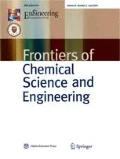Abstract
Chemical engineering is entering a new Golden Age of practice, thought, and impact, accompanied by great new opportunities and challenges. Five aspects mark this development: a new abundance of hydrocarbons; the evolution of biology into a molecular science; the ubiquity of powerful computational tools; the trend in manufacturing to be more process-oriented; and the systems approach that is part of ChE education from its first stages. There are important technical challenges, including technology creation and environmental impact, but just as important are new appreciation for and attention to challenges that require societal dialogues about complexity, uncertainty, and evolving and sometimes contradictory requirements. Crucial to all these impacts is enhancing the identity of what the profession is. That must be based on recognizing that the core of chemical engineering is applying molecular sciences to create value and advance the quality of life.
Similar content being viewed by others
References
Cohen C. The Early History of Chemical Engineering: A Reassessment. British Journal for the History of Science, 1996, 29 (2): 171–194. http://www.jiscjournalarchives.ac.uk/openurl.html? ref = cup/BJH29_02/S000708740003421Xa.pdf
Hager T. The Alchemy of Air: A Jewish Genius, a Doomed Tycoon, and the Scientific Discovery That Fed the World but Fueled the Rise of Hitler. New York: Harmony Books. 2008
Torp C. The Great Transformation: German Economy and Society 1850–1914. In: Smith H W (ed.), The Oxford Handbook of Modern German History, 2011, 347–348
Dickey P A. The first oil well. Journal of Petroleum Technology, 1959, 59: 14–25
Chernow R. Titan: The Life of John D. Rockefeller, Sr. New York: Random House, 1998
Bullock A, Trombley S. The New Fontana Dictionary of Modern Thought. London: Harper-Collins, 1999
Scriven L E. On the Emergence and Evolution of Chemical Engineering. Advances in Chemical Engineering, 1991, 16: 3–40
Walker W H, Lewis W K, McAdams W H. Principles of Chemical Engineering. New York: McGraw-Hill, 1923
Gembicki S. Vladimir Haensel 1914–2002. In Biographical Memoirs, Vol 88. Washington, DC: National Academy of Sciences, 2006
Armstrong R C. R. Byron Bird: The integration of transport phenomena into chemical engineering. AIChE Journal [Online January 2014]
Wei J. A Century of Changing Paradigms in Chemical Engineering. Chemtech, 1996, 26(5): 16–18
Westmoreland P R. We Are ChE: Entering a Golden Age. http://chenected.aiche.org/series/we-are-che-entering-a-golden-age/. New York: AIChE, September–December 2012
U.S. Energy Information Administration. Recent production growth from presalt resources increases Brazil’s total crude output, 13 Nov 2013. http://www.eia.gov/todayinenergy/detail.cfm?id=13771
Landergan K. 3 local professors to get US honors: Obama to confer national medals. Boston (Massachusetts) Globe, 7 January 2013
Li J, Ge W, Wang W, Yang N, Liu X, Wang L, He X, Wang X, Wang J, Kwauk M. From Multiscale Modeling to Meso-Science: A Chemical Engineering Perspective. Berlin: Springer Verlag, 2013
TOP500 Supercomputer Sites. “China’s Tianhe-2 Supercomputer Maintains Top Spot on 42nd TOP500 List”. http://www.top500.org/blog/lists/2013/11/press-release/, 18 November, 2013
Longbottom R. Linpack Benchmark Results on PCs. http://www.roylongbottom.org.uk/linpack%20results.htm, Retrieved 21 January 2014
Wei J. Introductory remarks to Plenary Panel Discussion on “Chemical Engineering Research and Education in 21st Century”. Sixth Sino-US Joint Conference of Chemical Engineering, SINOPEC Conference Centre, Beijing, China, 7–10 November 2011
Gleick J. Chaos: Making a New Science. New York: Viking, 1987
Rittel H W J, Webber M W. Dilemmas in a General Theory of Planning. Policy Sciences, 1973, 4(2): 155–169
U.S. National Academy of Engineering. NAE Grand Challeges for Engineering. www.engineeringchallenges.org. Retrieved 21 January, 2014
McGee H A. Molecular Engineering. New York: McGraw-Hill, 1991
Author information
Authors and Affiliations
Corresponding author
Additional information
Phillip R.Westmoreland served as 2013 President of AIChE and is currently 2014 Past President. He is a professor at North Carolina State University in the Department of Chemical and Biomolecular Engineering.
His chemical engineering degrees are from N.C. State (BS ’73), LSU (MS ’74), and MIT (PhD ’86). He was previously in the coal-conversion program at Oak Ridge National Laboratory from 1974-1979, the faculty of Chemical Engineering at the University of Massachusetts
Rights and permissions
About this article
Cite this article
Westmoreland, P.R. Opportunities and challenges for a Golden Age of chemical engineering. Front. Chem. Sci. Eng. 8, 1–7 (2014). https://doi.org/10.1007/s11705-014-1416-z
Received:
Accepted:
Published:
Issue Date:
DOI: https://doi.org/10.1007/s11705-014-1416-z




